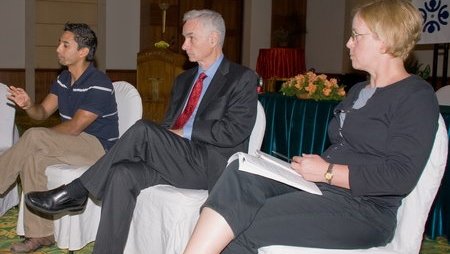
Global OLE Assembly Opened by Social Entrepreneurs and Government Officials
Nov. 2, 2009 Program Updates OLE Nepal
Kathmandu, Nepal – The opening sessions of the first Open Learning Exchange Global Assembly took place on November 2 at the Everest Hotel in Kathmandu, Nepal. Among those in attendance were Mahashram Sharma (Director General of Department of Education); Lawa Dev Awasthi (Joint Secretary of Nepal’s Ministry of Education); Haribol Khanal (Executive Director of Nepal’s Curriculum Development Center); Prativa Pandey (Chairperson of the Board of Directors of OLE Nepal and Chair of the opening session); Richard Rowe (Founder and CEO of OLE International) and members of his team; Kedar Bhakta Mathema (Former Vice Chancellor of Tribhuvan University and the Chief of the advisory board of OLE Nepal); Rabi Karmacharya (Executive Director of OLE Nepal) and members of his team; and the representatives from the various OLE Centers around the world participating in the conference.
The first session began with the ceremonial lighting of candles known as panas by the chief guest, Education Director General Mahashram Sharma. OLE Nepal’s Executive Director Rabi Karmacharya then delivered his welcome remarks. He highlighted the significance of education for “sustainable development, a vibrant economy, an equitable and just society, lasting peace, communal harmony, and international understanding.” He also spoke of the unique opportunity that this global assembly provides for collaboration on education endeavors and for mutual learning between the participants in order to truly tackle the challenges we all face in fostering responsible, skilled, and educated citizens of the world. He expressed pride in Nepal being chosen as the venue for the first OLE global assembly, in recognition of the achievements that have been made by the OLE Center here. He emphasized the importance of viewing “technology as a means, but not an end in itself,” adding that the project in Nepal is not just a computer project but an attempt to use technology in the teaching-learning process to deliver quality education, making content creation and teacher training indispensable parts of the entire process. Finally he reasserted his belief that we can ensure each child quality basic education. “Ambitious? Yes. But not impossible,” he concluded.
Director General Mahashram Sharma welcomed the participants of the conference on behalf of the Government of Nepal’s Ministry of Education and the Department of Education. He spoke of the close working relationship that OLE Nepal and the Government of Nepal have established in implementing the project here in Nepal. He commended OLE Nepal’s efforts in creating child friendly learning materials and in teacher preparation and training to nurture “creative, knowledgeable, and skillful citizens.” He also highlighted the very significant “paradigm shift” that this project has triggered, in the role of teachers changing from “instructors” to “facilitators,” allowing for more self learning and creative growth among school children.
Open Learning Exchange International Founder Richard Rowe highlighted that there is much that can be learned from OLE Nepal, which he believes is emblematic of the model that is being implemented in other countries with OLE Centers. Within this model, three factors are instrumental in making a project like this successful, all of which OLE Nepal has been able to put together: leadership by a social entrepreneur, a committed and supportive board of directors, and a strong relationship with the local government, which is necessary to achieve educational transformation on a large scale. He stressed that OLE Nepal and its partners have shown that universal basic education can be achieved. Open Learning Exchange’s goal is to have 100 centers established worldwide following this model by the year 2015. Rowe also briefly spoke about what OLE does for its centers: helping new centers implement funding; building tools, such as the Billion Kids Library, that are freely available for use by all the centers; and enabling a global exchange of knowledge and experience among OLE Centers. He highlighted that the Assembly can act as a forum for the centers from around the world to discuss how they might use the Open Learning Exchange as a resource, what they can contributed to it, and how they would like to see it evolve.
On the first day, the Assembly focused on the need to create content and help teachers with their professional development as laptops and handheld devices are being increasingly used by teachers and students in developing countries.
“Content is at the core of all the work we do,” said OLE Nepal’s Rabi Karmacharya. He cited as examples OLE Nepal’s rollout of new Nepali-language learning tools for primary school mathematics and its close collaboration with the Ministry of Education on teacher training. Among the presentations from other countries, OLE Rwanda director Jacques Murinda described his center’s work to localize content from South Africa and digitally distribute it in Rwanda – whether for use on paper, on laptop, or on a handheld device. Yamandú Ploskonka, head of OLE Bolivia, spoke of his center’s work to translate educational materials into Aymara, a widely used indigenous language.
About OLE Nepal
OLE Nepal (www.olenepal.org) is a non-governmental social benefit organisation that has been working in partnership with the Government of Nepal to develop high-quality interactive digital learning materials, maintain a web-based education focused library for students and teachers, build the Nepali government’s capacity to independently develop, enhance, and maintain ICT-based teaching-learning materials at the primary and secondary school levels, and implement a plan to provide universal access to primary school level ICT-based teaching-learning materials by 2015.
About OLE International
OLE International (www.ole.org) helps connect and equip social entrepreneurs in OLE Centers around the world, enabling them to demonstrate education.
